RudderStack React Native Integration
Overview
The RudderStack React Native SDK allows you to track event data from your React Native applications and send it to CleverTap via RudderStack.
Prerequisites
The following are the prerequisites for performing this integration:
- A CleverTap account
- A RudderStack account
- A Functional React Native app
Integration
For CleverTap RudderStack React Native integration, the following are the major steps:
- Set Up Source and Destination at RudderStack.
- Install SDK in React Native Application.
- Initialize RudderStack Client.
Set Up Source and Destination at RudderStack
To set up source and destination at RudderStack:
- Navigate to Connect > Sources from the RudderStack dashboard.
- Click New source to add a new source and then select React Native from the list of sources.
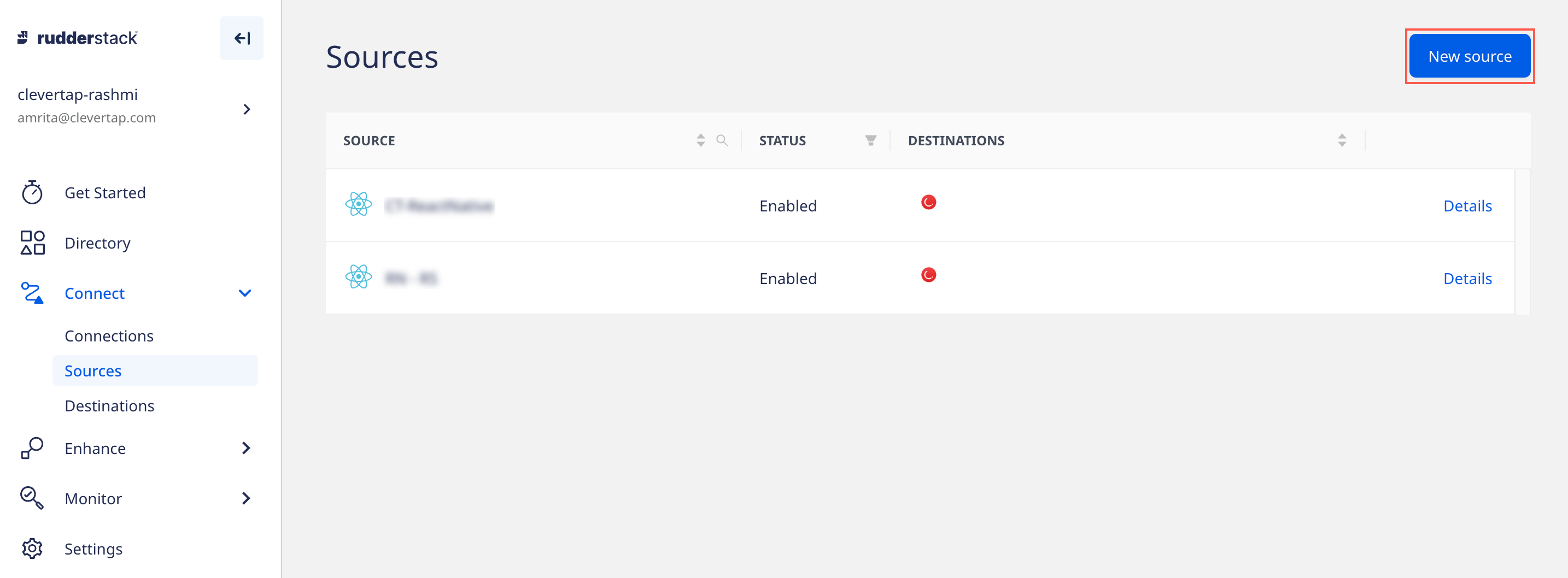
Add New React Native Source
- Enter the source name under Name this source field to identify it within your workspace and click Continue. The Write Key for this source displays, as shown in the following figure:
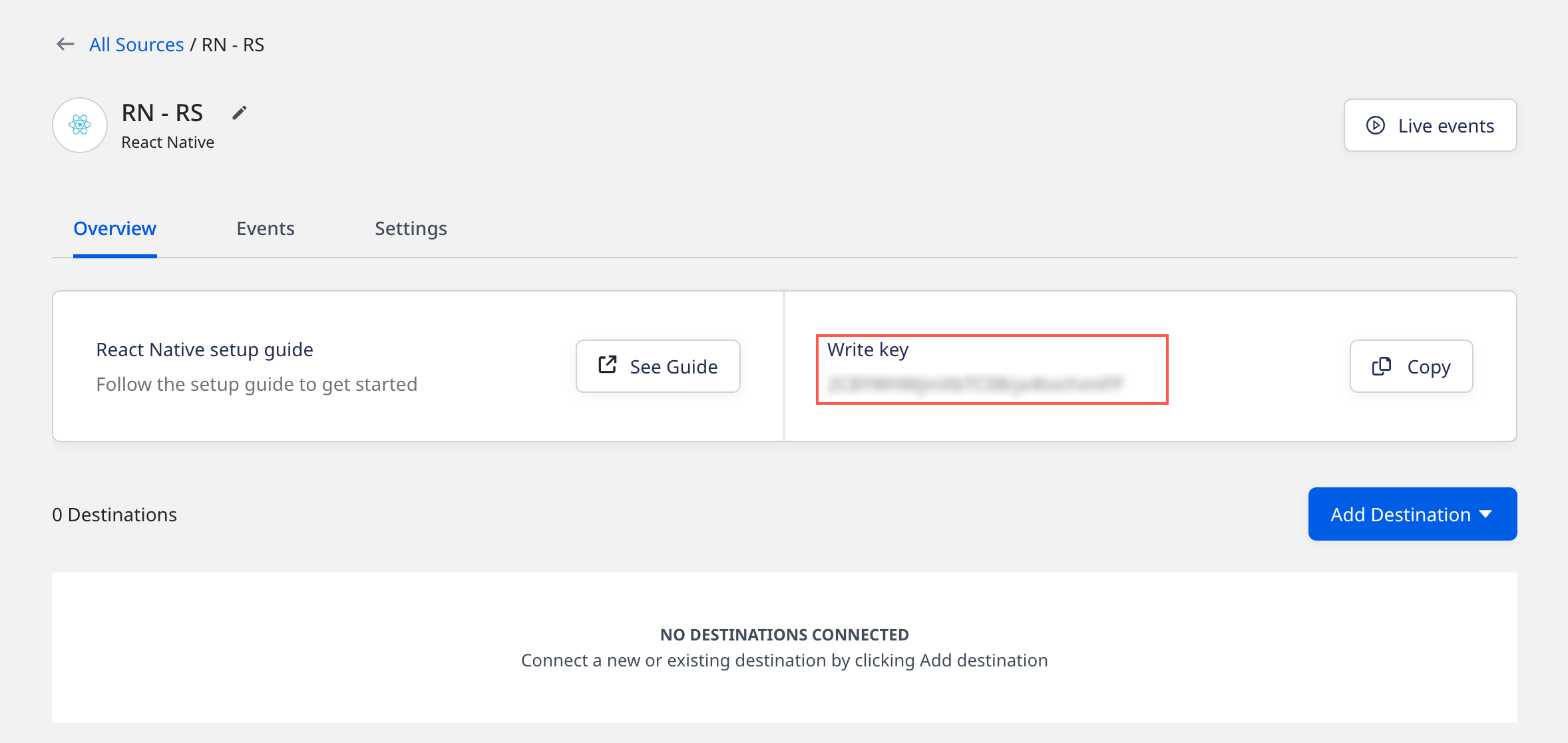
Write Key for React Native
- Click Add Destination and select the following options from the dropdown as per your requirement:
- Use Existing Destination: Select from the list of available destinations.
- Create new Destination: Create a new destination for your source.
- Select CleverTap from the destination list and click Continue.
- Enter the destination name under Name the destination field to identify it in your workspace and click Continue. The Connection Settings page displays.
- Enter the following CleverTap details:
- Account ID: A unique ID generated for your account. It is available under Settings > Project as the Project ID.
- Passcode: A unique code generated for your account. It is available under Settings > Project as the Passcode.
- Token: A unique code generated for your account. It is available under Settings > Project as Token.
- Region: Server Only. This is the region assigned to your CleverTapaccount. Refer to the following table to identify it:
| CleverTap Dashboard URL | Region |
|---|---|
| https://in1.dashboard.clevertap.com/login.html#/ | India |
| https://sg1.dashboard.clevertap.com/login.html#/ | Singapore |
| https://us1.dashboard.clevertap.com/login.html#/ | US |
| https://sk1.dashboard.clevertap.com/login.html#/ | South Korea |
| https://eu1.dashboard.clevertap.com/login.html#/ | None |
| https://aps3.dashboard.clevertap.com/login.html#/ | Indonesia |
| https://mec1.dashboard.clevertap.com/login.html#/ | Middle East (UAE) |
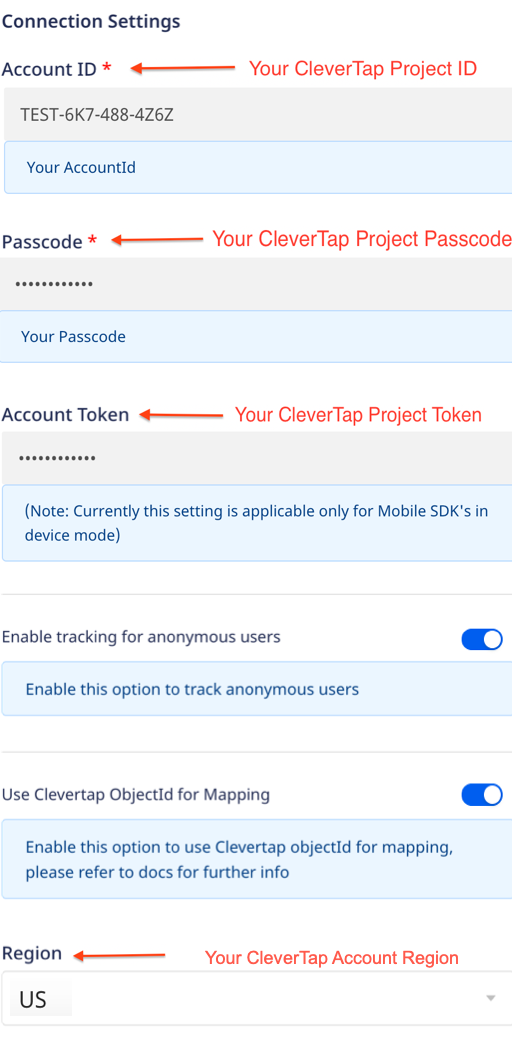
Enter CleverTap Details
- Select the Enable tracking for anonymous user option to track anonymous users in CleverTap.
- Select the Use Clevertap ObjectId for Mapping option under React Native SDK settings section.
This option enables both CleverTapobjectIdandidentityto map events from RudderStack to CleverTap. - Click Continue. The Transformation settings page displays.
- Select No transformation needed if you do not want to customize JavaScript code functions to implement specific use cases on your event data.
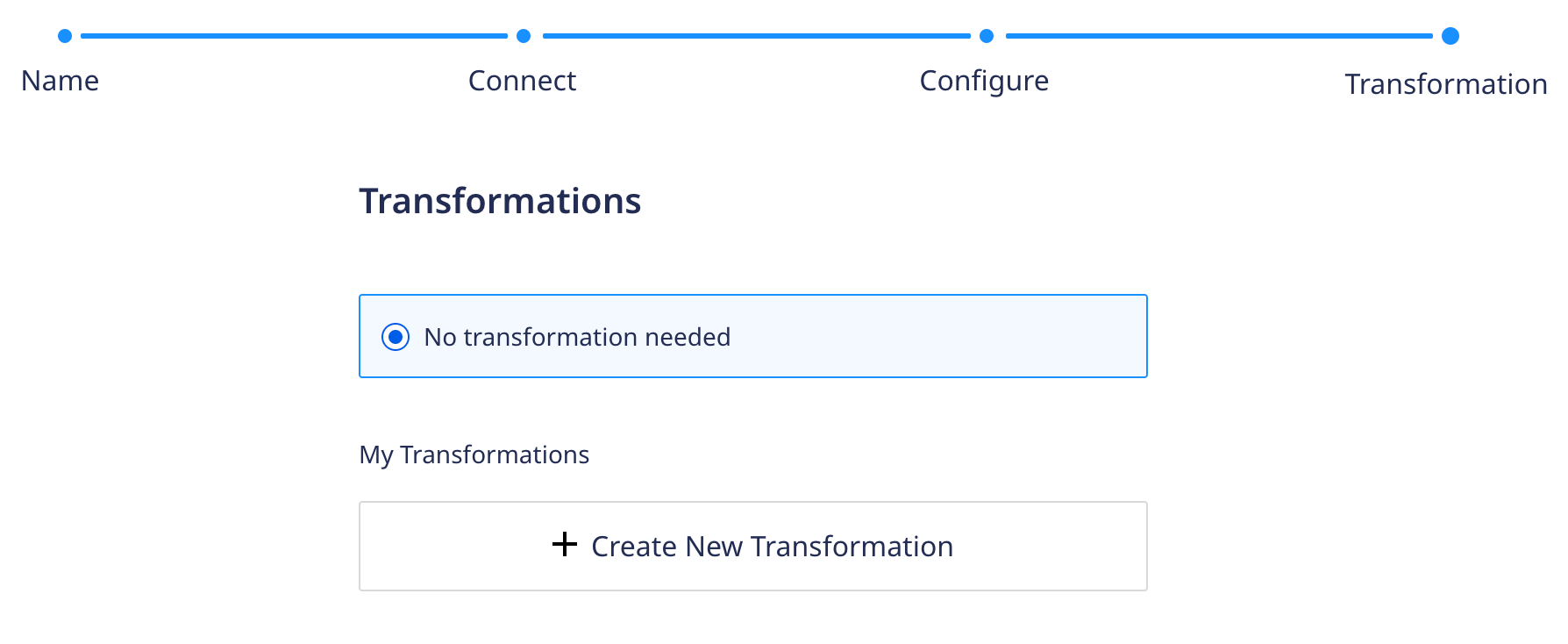
Select Transformations
- Click Continue. The connection is now established between source and destination. You can check if the connection is enabled under Connect > Connections.

View the Connection
Install SDK in React Native Application
We recommend installing the React Native SDK through npm. To add the SDK as a dependency, perform the following steps:
- Navigate to the root of your application and add
@rudderstack/rudder-sdk-react-nativeto your application as a dependency with:
npm install @rudderstack/rudder-sdk-react-native --saveOR
yarn add @rudderstack/rudder-sdk-react-native- Add the RudderStack-CleverTap module to your app using the following code:
npm install @rudderstack/rudder-integration-clevertap-react-nativeOR
yarn add @rudderstack/rudder-integration-clevertap-react-native- Navigate to your Android/App folder and add the following dependency to your
app/build.gradlefile:
implementation 'com.clevertap.android:clevertap-android-sdk:4.4.0'
implementation 'com.google.android.gms:play-services-base:17.4.0'
implementation 'com.android.installreferrer:installreferrer:2.1'
implementation 'com.google.firebase:firebase-messaging:20.2.4'
implementation project(':clevertap-react-native')
implementation 'com.github.bumptech.glide:glide:4.11.0' //Mandatory for App Inbox
implementation 'androidx.recyclerview:recyclerview:1.1.0' //Mandatory for App Inbox
implementation 'androidx.viewpager:viewpager:1.0.0' //Mandatory for App Inbox
implementation 'com.google.android.material:material:1.3.0' //Mandatory for App Inbox
implementation 'androidx.appcompat:appcompat:1.2.0' //Mandatory for App Inbox
implementation "androidx.swiperefreshlayout:swiperefreshlayout:1.0.0"
implementation 'androidx.core:core:1.3.0'
implementation 'androidx.fragment:fragment:1.1.0' // InApp
implementation 'com.google.android.exoplayer:exoplayer:2.11.5' //Optional for Audio/Video
implementation 'com.google.android.exoplayer:exoplayer-hls:2.11.5' //Optional for Audio/Video
implementation 'com.google.android.exoplayer:exoplayer-ui:2.11.5' //Optional for Audio/Video
implementation 'com.android.support:multidex:1.0.3'- Open the
iOS folderfrom your terminal and install all the pod files with the following command:
pod installInitialize RudderStack Client
To initialize the RudderStack client:
- Import the module you added above as shown below:
import rudderClient from '@rudderstack/rudder-sdk-react-native';
import clevertap from "@rudderstack/rudder-integration-clevertap-react-native";
const CleverTap = require('clevertap-react-native');- Initialize the CleverTap-RudderStack SDK as follows:
const config = {
dataPlaneUrl : "YOUR_DATA_PLANE_URL",
logLevel: 3,
trackAppLifecycleEvents: true,
recordScreenViews:true,
withFactories: [clevertap]
};
rudderClient.setup("YOUR_WRITE_KEY", config);trackAppLifecycleEvents: This method allows the Rudderstack SDK to capture the Lifecycle events.logLevel→ This method allows you to go through the application log when developing the application.
Data Plane URL and Write KeyYou can obtain Data Plane URL and Write Key from the RudderStack dashboard under Connect > Connections.
Push User Profiles
You can call rudderClient.identify() for pushing user profiles whenever you want to identify the user in your application, that is, when a user logs in or registers to your application or when you want to update any user information. After installing an app on a device, your user is assigned an "anonymous" profile. The first time when the application identifies the user on the device, the "anonymous" history on the device is associated with the newly identified user. You can call this method as follows:
rudderClient.identify("userid", {
name: "Name Surname",
email: "[email protected]",
phone: "+919869357572",
gender: "F",
city: "Mumbai",
region: "Malad",
country: "India",
"MSG-email": true,
"MSG-sms": true,
"MSG-push":true,
})
}Replace userID with the unique identifier for your application. This identifier must match the identifier selected on the CleverTap dashboard.
Push Events
You can call rudderClient.track() for pushing events whenever you want to capture any user action in your application. For example, when a user views any product, and you want to capture this event, then call this method and pass the following parameters:
- Event: Product Viewed
- Event Properties: Product viewed, Category, and Amount
Event Property Data Types
- The value of a property can be of type Integer, Long, Double, Float, Character, String, a Boolean.
- The Date value must always be passed as $D_EPOCH value only.
Calling a push method may vary based on the type of event as follows:
- All events except the Order Completed event:
rudderClient.track("Checked Out", {
Clicked_Rush_delivery_Button: true,
total_value: 2000,
revenue: 2000,
});- Order Completed (equivalent to the Charged event in CleverTap)
rudderClient.track("Order Completed", {
checkout_id: "12345",
order_id: "1234",
affiliation: "Apple Store",
"Payment mode": "Credit Card",
total: 20,
revenue: 15.0,
shipping: 22,
tax: 1,
discount: 1.5,
coupon: "Games",
currency: "USD",
products: [
{
product_id: "123",
sku: "G-32",
name: "Monopoly",
price: 14,
quantity: 1,
category: "Games",
url: "https://www.website.com/product/path",
image_url: "https://www.website.com/product/path.jpg",
},
{
product_id: "345",
sku: "F-32",
name: "UNO",
price: 3.45,
quantity: 2,
category: "Games",
},
{
product_id: "125",
sku: "S-32",
name: "Ludo",
price: 14,
quantity: 7,
category: "Games",
brand: "Ludo King",
},
],
})Integrating Push Notification in Android and iOS
The steps for integrating push notifications in Android and iOS are the same as in React Native. For more information on detailed steps, refer to React Native Push Notification.
Advanced Features
Debugging
You can view the debugging logs in Android Studio. After you run the application, navigate to Android Studio > Logcat and search by CleverTap. The printed logs display all information associated with CleverTap. You can use this log to identify your CleverTap ID, check the events and user information that are getting pushed to CleverTap, etc.
The following is an example display of a Logcat in your Android Studio:
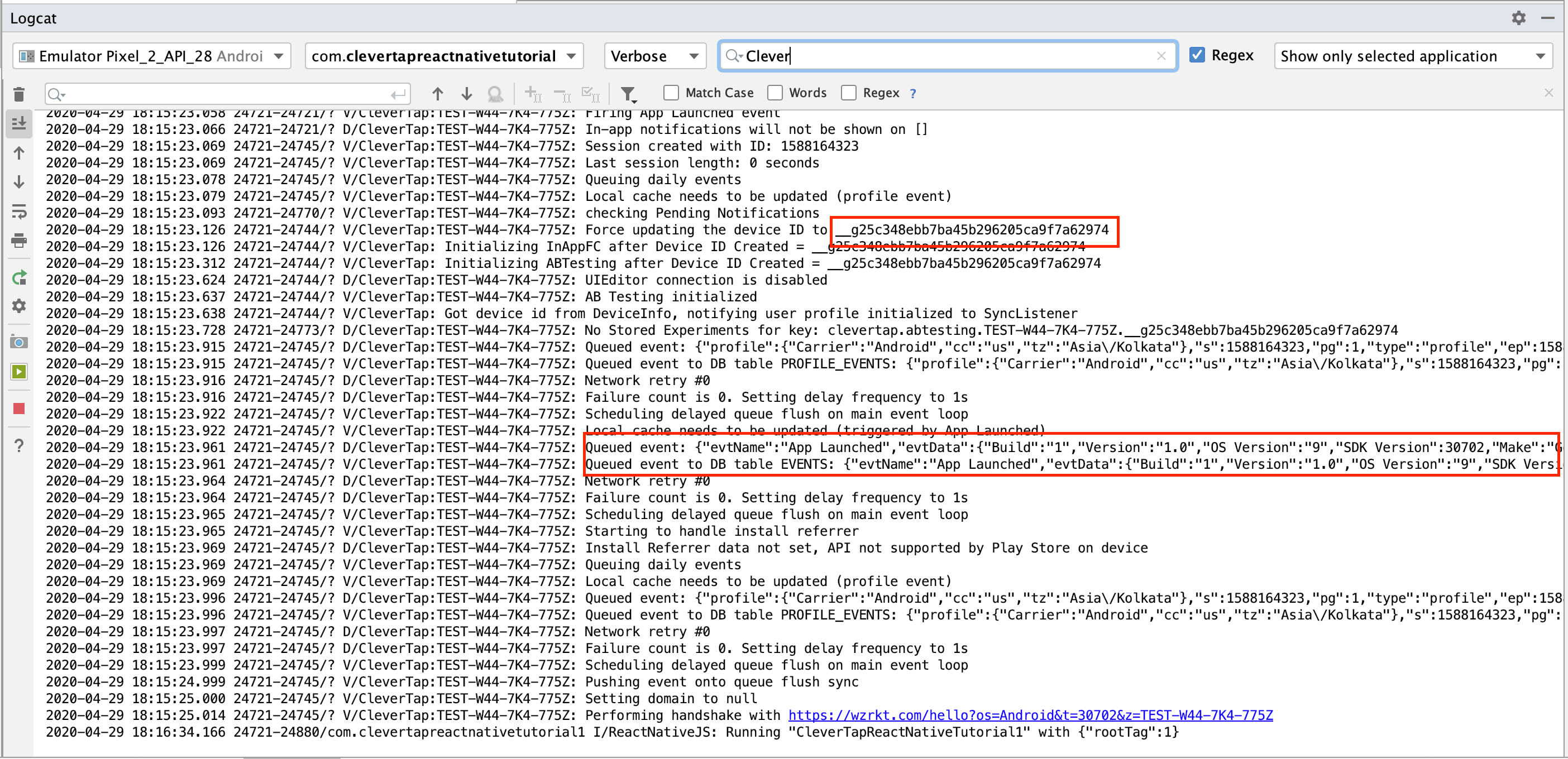
RudderStack Debugging
Troubleshooting
- Error Message: If you are getting the following error:
Note: Recompile with -Xlint:deprecation for details.
D8: Cannot fit requested classes in a single dex file (# methods: 79994 > 65536 ; # fields: 68161 > 65536)
com.android.builder.dexing.DexArchiveMergerException: Error while merging dex archives:- Reason: Android can build files only up to 65K; if it exceeds that, you will get this error.
- Solution: Add the following code in your
android/app/build.gradlefile:
defaultConfig {
multiDexEnabled true
}
App Launched Event for AndroidCurrently, the App Launched event is not correctly captured. However, you can use the RudderStack Lifecycle events to capture this information.
Updated 3 months ago
